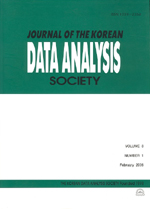Analysis of Repeated Measurements on Iowa Gambling Task Study
- 한국자료분석학회
- Journal of The Korean Data Analysis Society (JKDAS)
- Vol.9 No.6
-
2007.122623 - 2629 (7 pages)
- 3

To reduce a learning effect or test-retest effect is very important in Iowa Gambling Task(IGT) studies that inspect cognitive components in decision making process since the gambling tasks are repeated over time. To this end, two new tasks, namely K and Q, have been developed and proposed to reduce the learning effect. In this study, we examine the effectiveness of these two tasks on reduction of learning effect based on repeated data collected from 75 healthy subjects. A linear mixed effects model was utilized for the analysis to account for the within-subject correlation. The first order ante dependence variance-covariance structure is selected for the final model after several variance covariance structures are compared based on Akaike information criterion(AIC). The results show that participants performance is similar across the three gambling tasks regardless of learning effect. Therefore, the utilization of the original task A followed by the new tasks K and Q will effectively distinguish the cognitive components from the learning effect in decision making process in gambling task studies.
1. Introduction
2. Study Design and Gambling Task
3. Statistical Analysis
4. Result
5. Discussion
References
(0)
(0)